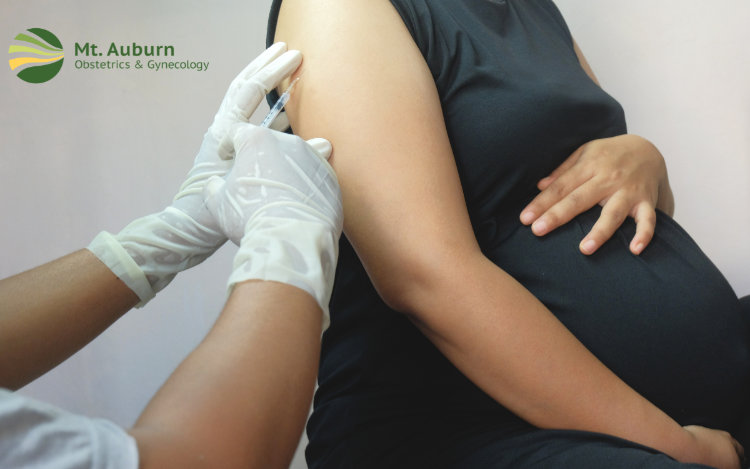It’s no secret that the COVID-19 vaccines work to curb the spread and protect individuals from developing severe illness—and the same rule applies to COVID-19 booster shots.
According to the CDC, pregnant individuals and those who recently gave birth (within 42 days) are considered high-risk for developing severe illness from COVID-19. That fact alone is enough to convince any parent-to-be to take precautions during the global pandemic.
For those who want to take steps to protect themselves and their babies, here’s everything pregnant people need to know about getting the COVID-19 booster shot.
OBGYNs recommend COVID-19 booster shots for pregnant individuals.
If you’re over 12 years old and eligible for a COVID-19 booster shot, the recommendation is that you should get one—and that includes pregnant people and those who are breastfeeding. It is not only safe but recommended that pregnant and recently pregnant individuals receive a COVID-19 booster.
Pregnant and lactating individuals should receive either a booster shot or a vaccine series (if they haven’t already gotten one). And if you don’t believe us, expect your OBGYN to recommend the COVID-19 booster shot or vaccine at your next appointment.
COVID-19 booster shots and vaccines are safe to administer with other routine vaccines.
During pregnancy, you’ll likely receive vaccines such as influenza and Tdap, which doctors recommend be administered routinely. So, a common question is whether it is safe to receive a COVID-19 booster if you’re already receiving other vaccines. Well, there’s good news.
Studies have shown that it is in fact safe to receive a COVID-19 booster shot alongside or shortly before or after receiving other vaccines—and that goes for non-pregnant and pregnant individuals. It is normal and safe to receive your COVID-19 booster shot simultaneously with other vaccines. So, when you stop in to get your flu shot, consider asking about the COVID-19 booster. Although this research gives us an overall measure for most pregnant women, it is important to always consult with your OBGYN as all pregnancies are different.
Your original vaccine manufacturer does not determine which booster you may receive.
When vaccines rolled out, we all understood that your second shot in the series needed to be the same as the first, whether you received Pfizer or Moderna (and those who received the J&J only needed a single shot).
Now, some wonder if they still need to stick with their original vaccine manufacturer for the booster shots. You don’t. Anyone who received a Pfizer, Moderna, or J&J vaccine series can receive a booster shot from any manufacturer.
This is great news because when you’re pregnant, energy levels can fall low as stress levels rise. Rest assured that you don’t need to worry about this aspect of your booster shot.
You likely need a booster six months after being fully vaccinated, but it may be as little as two months.
For those who received the Moderna or Pfizer mRNA vaccine, booster shots are recommended after six months following your status as fully vaccinated. You’re considered fully vaccinated two weeks following your second dose—that’s five weeks after your first dose of Pfizer or six weeks after your first dose of Moderna.
However, if you received the J&J single-dose vaccine (also known as Janssen), you’re due for a booster two months after the date of your initial vaccine.
So, check your vaccine card to determine when you’re eligible to receive your COVID-19 booster shot. Being pregnant (or recently pregnant) classifies you as high-risk of becoming severely ill from COVID-19. So, get your booster as soon as you are eligible and be sure to consult with your OBGYN.
If it’s already been more than six (or two) months, don’t worry. When it comes to booster shots, it’s better late than never.
If you’re pregnant and high risk for contracting COVID-19, you really should receive your booster as soon as you are eligible.
Waiting to receive your booster shot isn’t necessarily a problem when you’re a healthy and non-pregnant person, but if you’re pregnant and have other factors that contribute to your risk, receiving your booster sooner rather than later is extremely important for your (and your baby’s) health and safety. You and your doctor will be able to determine when it may be “too late” in the pregnancy, and can create a timeframe from there.
If you’re pregnant and at high risk for contracting or spreading COVID-19, being diligent about your vaccines and boosters could save your life. High-risk individuals include people who:
- are over the age of 65
- have underlying medical conditions such as asthma or diabetes (see a complete list here)
- belong to a racial or ethnic minority
- have disabilities
- work or live in a high-risk setting such as healthcare, nursing homes, or other institutions
Check with your doctor to confirm whether or not you are considered a “high-risk” pregnancy.
Final thoughts: Schedule your booster shot today
COVID-19 booster shots are as widely available as the flu shot. In most places, you can receive a booster shot for free when you walk into your local clinic or CVS.
You can also schedule an appointment with our doctors for a consultation.
You can also use this helpful resource to find a location near you that offers booster shots. You can narrow down search results by location and vaccine type.
Still have questions? Learn more about the COVID-19 booster shots on the CDC’s website here.
